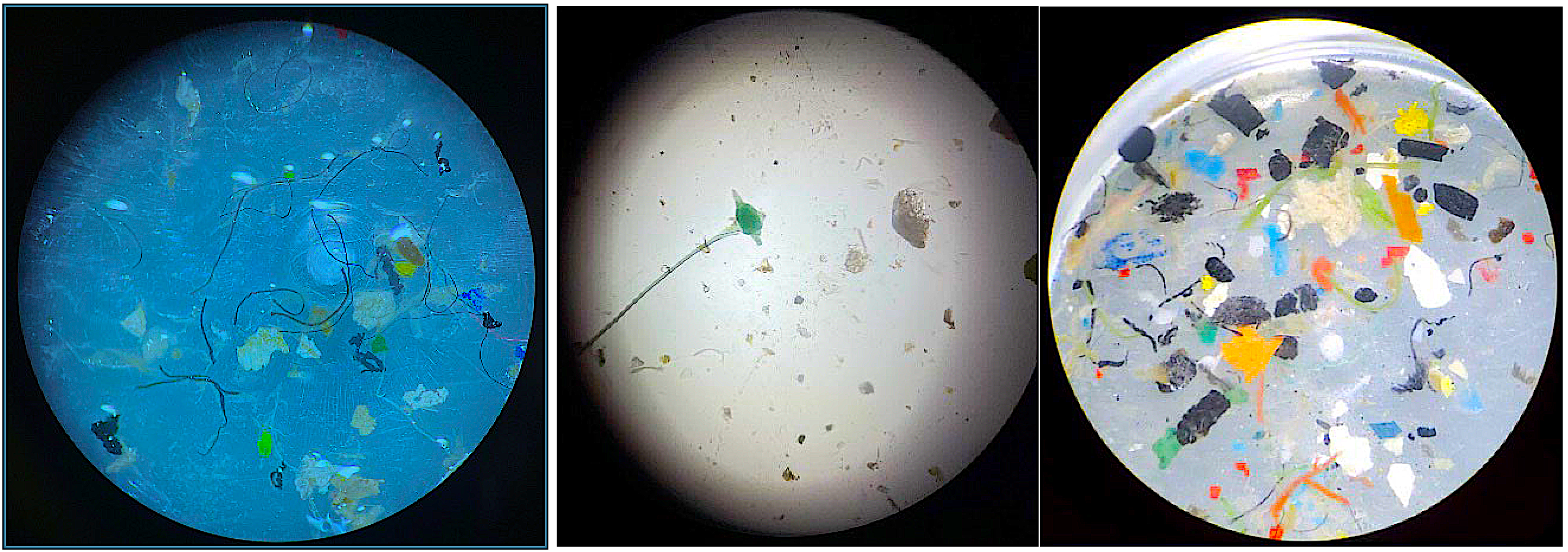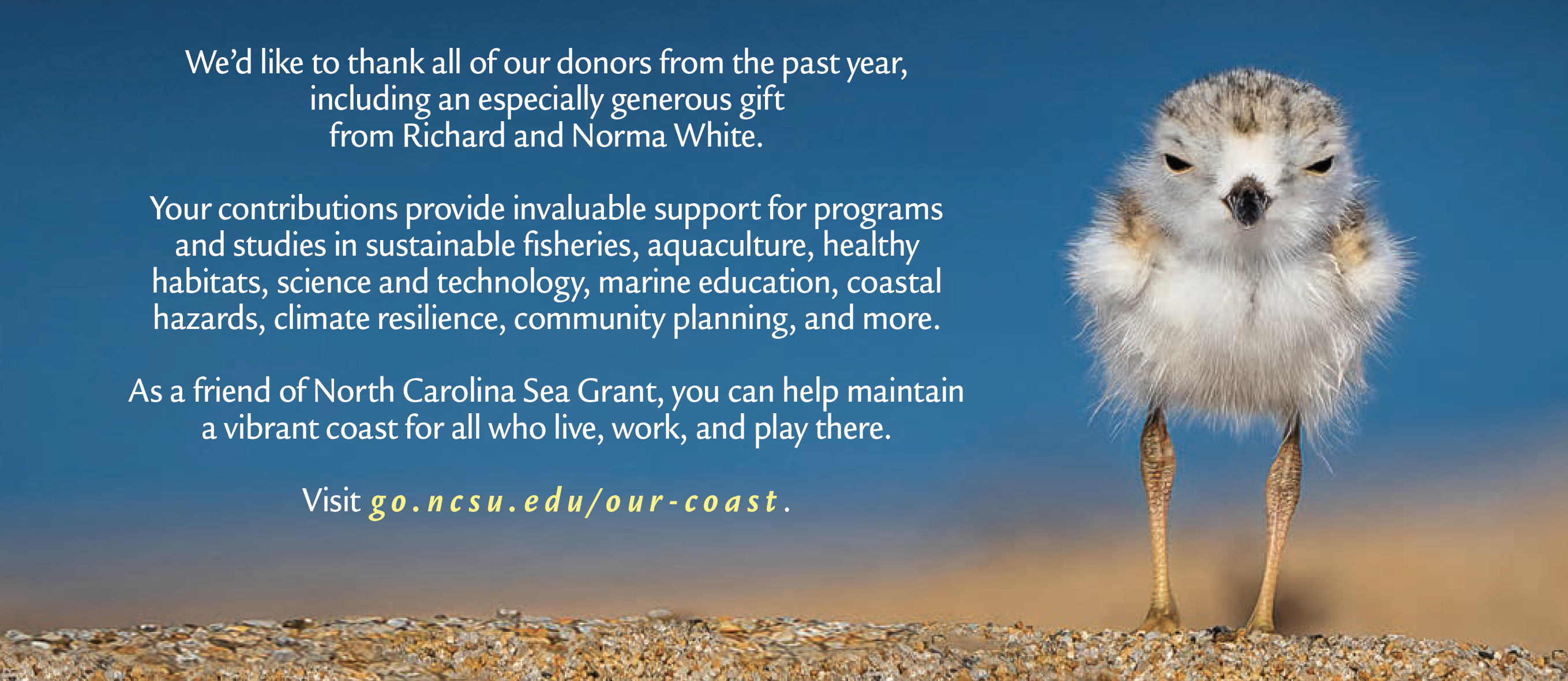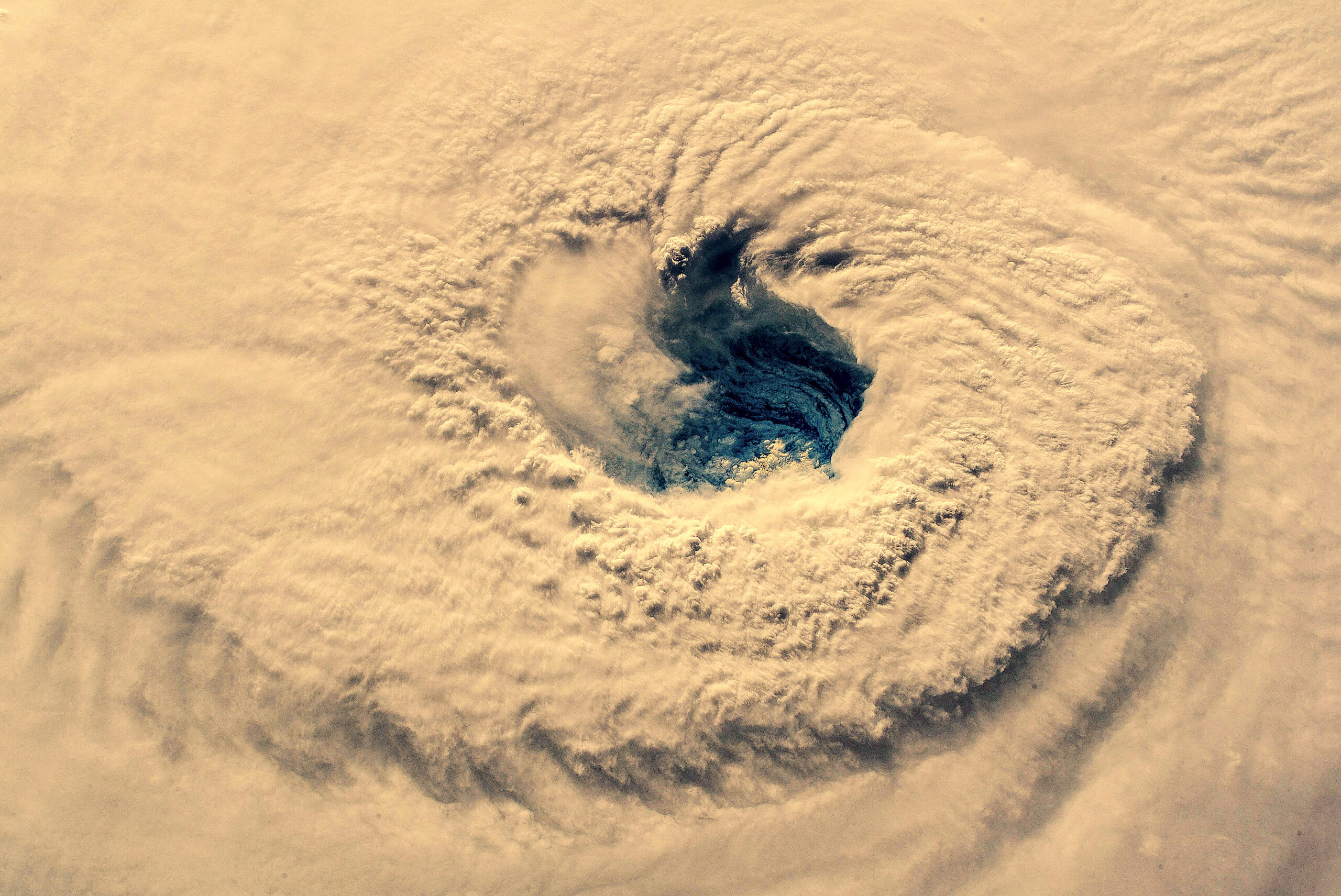The Art of Being You: Ecology, Psychology, and the Art of Being You
An Interview with Dr. J. Drew Lanham, MacArthur Fellow
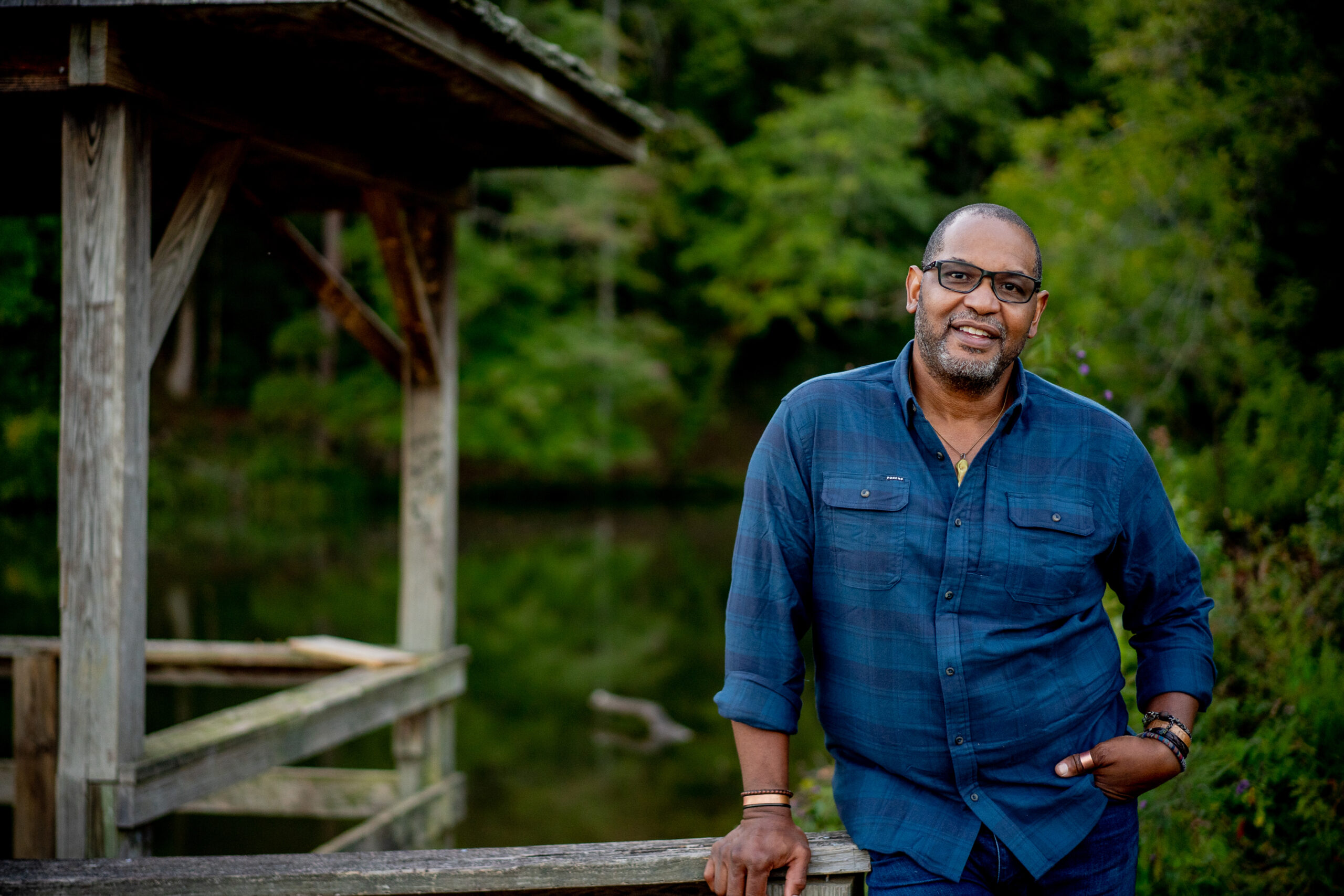
Growing up on a family farm in Edgefield, South Carolina, Joseph Drew Lanham, “Drew,” to many, knew he wanted to be an ornithologist by the third grade.
As a Black naturalist, writer, and MacArthur Fellow, Lanham chooses to combine science with blunt realities — particularly when it comes to recognizing that the field of ecology traditionally has not been Black and White. In doing so, he deepens conservation science with personal, historical, and cultural narratives.
Avian ecologist and Coastwatch contributing editor Lauren D. Pharr interviewed Lanham at Simpson Station, part of Clemson University, where he is an Alumni Distinguished Professor of Wildlife Ecology. Together, they reflected on ecology and society.
Watch “The Art of Being You” interview:
Lauren D. Pharr: You are an ornithologist, naturalist, writer, and poet. Your books, The Homeplace and Sparrow Envy, both of which capture your love affair with nature, continue to be beloved reads for so many. How have you learned to combine conservation science with personal, historical, and cultural narratives of nature? When you get an idea for a story or poem, what are the steps you take to craft it into something that is creative and meaningful?
J. Drew Lanham: You know, Lauren, it’s all of those things. All of those labels of who it is that I am: the ornithologist, the bird watcher, the conservationist, ecologist, poet, writer. All of those things converge really around identity. And you and I as birdwatchers, right, we’re always out identifying things.
But you know, the cultural aspects come into identity of who it is that I am as a Black man in the south. And so that’s what I like to think of as the axis of discovery, or even of kind of a scaffolding of how I operate as a professional.
So, thinking about my identity, as, well, a Southerner, a southern Black man, an ornithologist, an ecologist, a poet, but then thinking about place, right? So then place blends into that in terms of the South. I mean, I’m all over the place, but the South is home. But then thinking about wild places. So, identity in place, in nature — birds, wild birds —all of that comes into almost anything that I do.
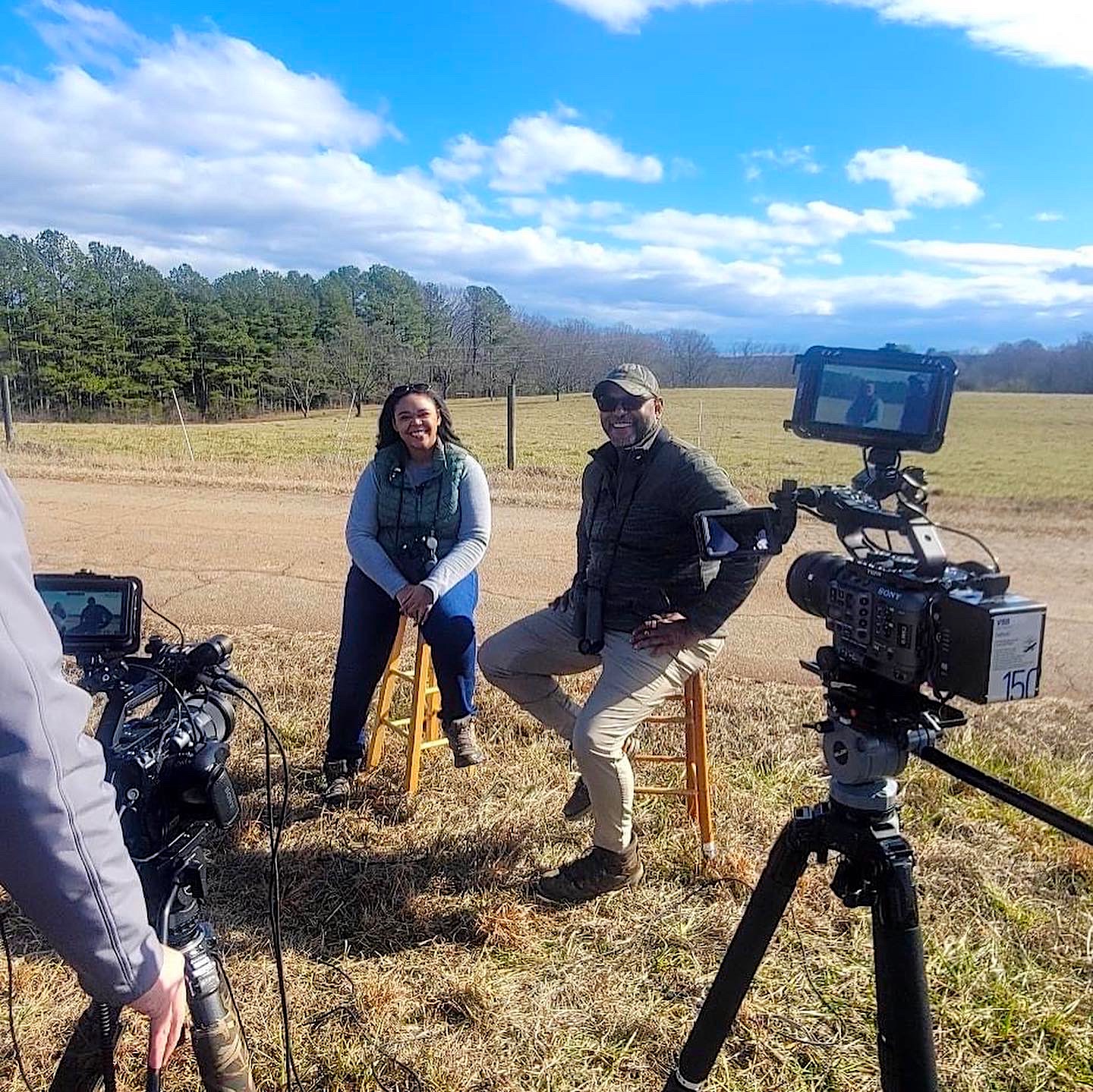
And that’s the science of me, and that’s the art of me, and I think it’s who we all are, right? You know the aspects of what you do. And in climbing ladders, you know, to investigate what’s going on with red-cockaded woodpeckers.
You know, there’s an art to being who you are. And there’s a science to it. And so, I like to think about first person as the data we know best. When you go in the field, you know who you’re going to be on that ladder, right? Now, you’re trying to get to know the birds and the place. How do you do that? You do that by the science, by collecting the data. But you also do that on a particular day. You know, it might be not so good a day, everywhere else, but you get into the piney woods. And that smell, that aroma hits you? What is that like?
Lauren D. Pharr: Yes, the smell, I mean, the sounds, it just, it takes you away really, from everything else that you have on your mind, just being out there in the quiet, but not really quiet. You know, you’re out there, you’re hearing the wind blow, you’re hearing the wiregrass, you know, swaying back and forth. You’re hearing all of these wonderful birds. I mean, you know, being in one of the diverse ecosystems out there, the longleaf pine ecosystem, at that moment you’re just so appreciative of nature as a whole, just experiencing all of these amazing creatures and the plants, the animals, the habitat as a whole. It’s, I mean, it’s remarkable. It really, really is.
J. Drew Lanham: And that’s the art of you. And that scene you just described, there’s ecology. There’s psychology. There’s also a spiritual nature to it. And so, all of that goes into what I write. It goes into a poem. You know, we’re out here in this space, and I’ve written lots of poems about shrikes, and grasshopper sparrows and eastern meadowlarks, and flocks of murmuring cowbirds. And maybe birds in that flock that I couldn’t identify. But I could identify with. So that’s, that’s how I tried to bring that to fore.
Lauren D. Pharr: Talking about poetry, you have a sensational way with words. Your poetry is memorable. In fact, one of my favorite pieces is “Nine Rules of the Black Birdwatcher.” You know how to combine humor and intellect to speak on social issues, particularly when it comes to Black individuals and these risks and perceptions of us in the outdoors. How have you learned to become comfortable with pushing the envelope when it comes to talking about these sensitive topics?
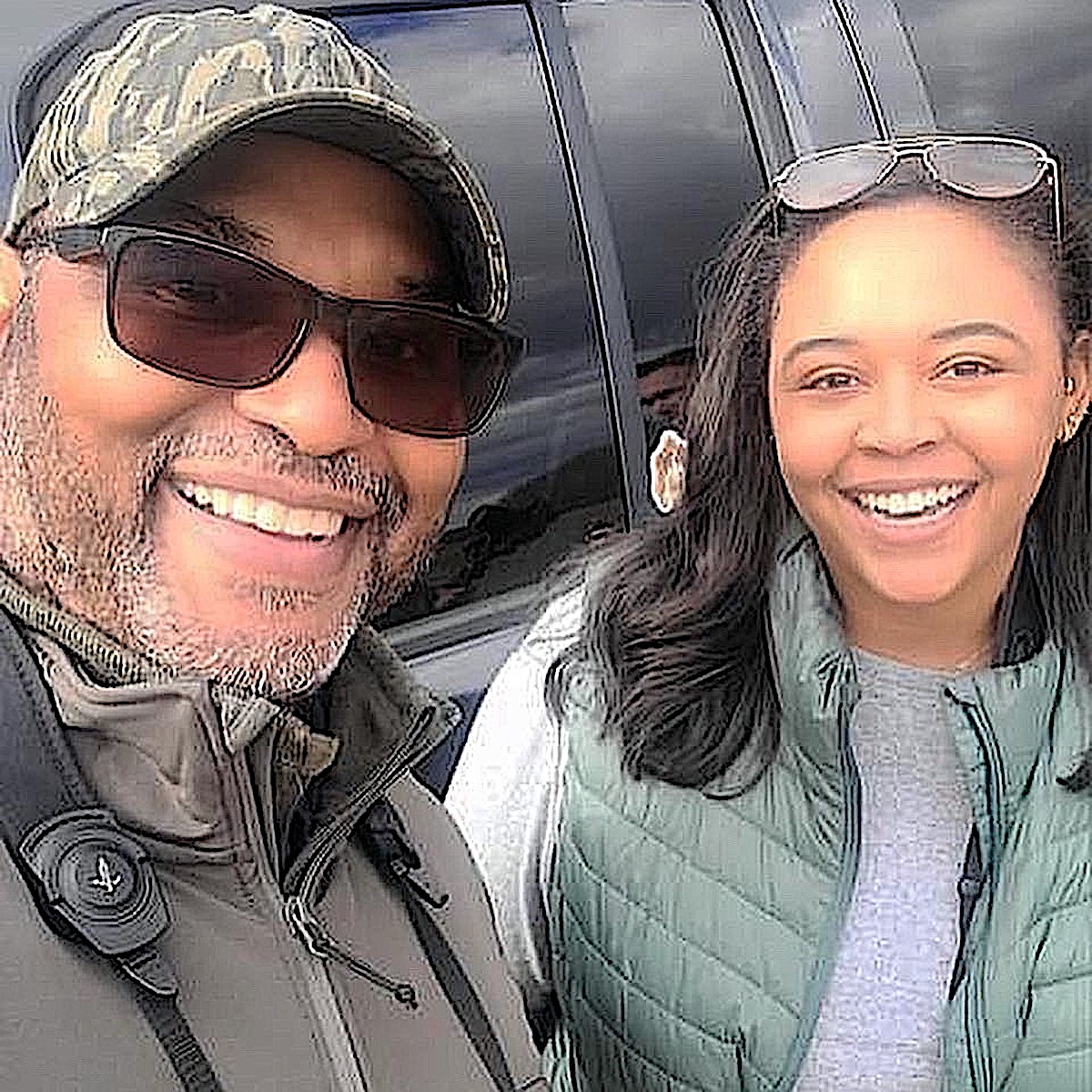
J. Drew Lanham with Lauren D. Pharr.
J. Drew Lanham: Actually, I got tired of being in the envelope. I got tired of being sort of shut up inside other people’s or society’s expectations, and sealed inside. I see it really is not having much of a choice, if you want to be free.
So, I think the poet’s responsibility, part of it, lies in urgency. And there’s nothing more urgent than being Black in America. You know, sitting where we are, for example, the people out here know me, but if I was in some strange place, a Black man alongside the road with binoculars just out looking, people might not perceive me the same way. And so I think people need to understand that as we are watching, sometimes we’re being watched, you know.
I equate it to almost like having the ice spots of like a ferruginous pygmy owl or something like that on the back of our heads, and we have to be consciously and constantly conscious of where we are, and how we’re being perceived. So, poetry gives me an opportunity.
“The Nine Rules for the Black Birdwatcher” gave me an opportunity to use satire to get a point across, because ultimately, you know, no one wants to be beat across the head with a
point as cogent as the point may be. And so it’s also important to give a little bit of medicine with the sugar.
You know, in that way, I want people to maybe think about laughing and then they laugh — then think about why they had to think about why they laugh.
For example, one of my favorite lines from that poem, but this is really, really real: “Never wear a hoodie, ever.” That came from Trayvon Martin, and that was so real and so fresh when I wrote that it was not far removed from that murder. And I was thinking about being out as a birder, and then how I am perceived.
And so does that mean I need to wear a Tilley hat and a khaki vest and big pocket cargo pants? I hope not, because I don’t want to do that. I want to be who I am.
But it’s also something that we have to think about, that you have to think about when you’re out. I mean, things that other people take for granted, you can’t. We can’t.
Lauren D. Pharr: So, Drew, walk me through the exact moment when you found out that you were a MacArthur Fellow. How did it feel to be named alongside so many groundbreaking, deserving individuals, like Robin Wall Kimmerer, renowned author of Braiding Sweetgrass: Indigenous Wisdom, Scientific Knowledge and the Teachings of Plants?
J. Drew Lanham: Unbelievable. There was just silence. And, then I lost it. There was some sort of weird, you know, guttural, primal scream, and then tears and still disbelief. It’s validation.
You know, because we’re always evaluating ourselves. You know, I talked about first person being the data that we know best, but we’re always evaluating ourselves. And unfortunately, imposter syndrome is part of what we have to deal with.
Lauren D. Pharr: Most definitely.
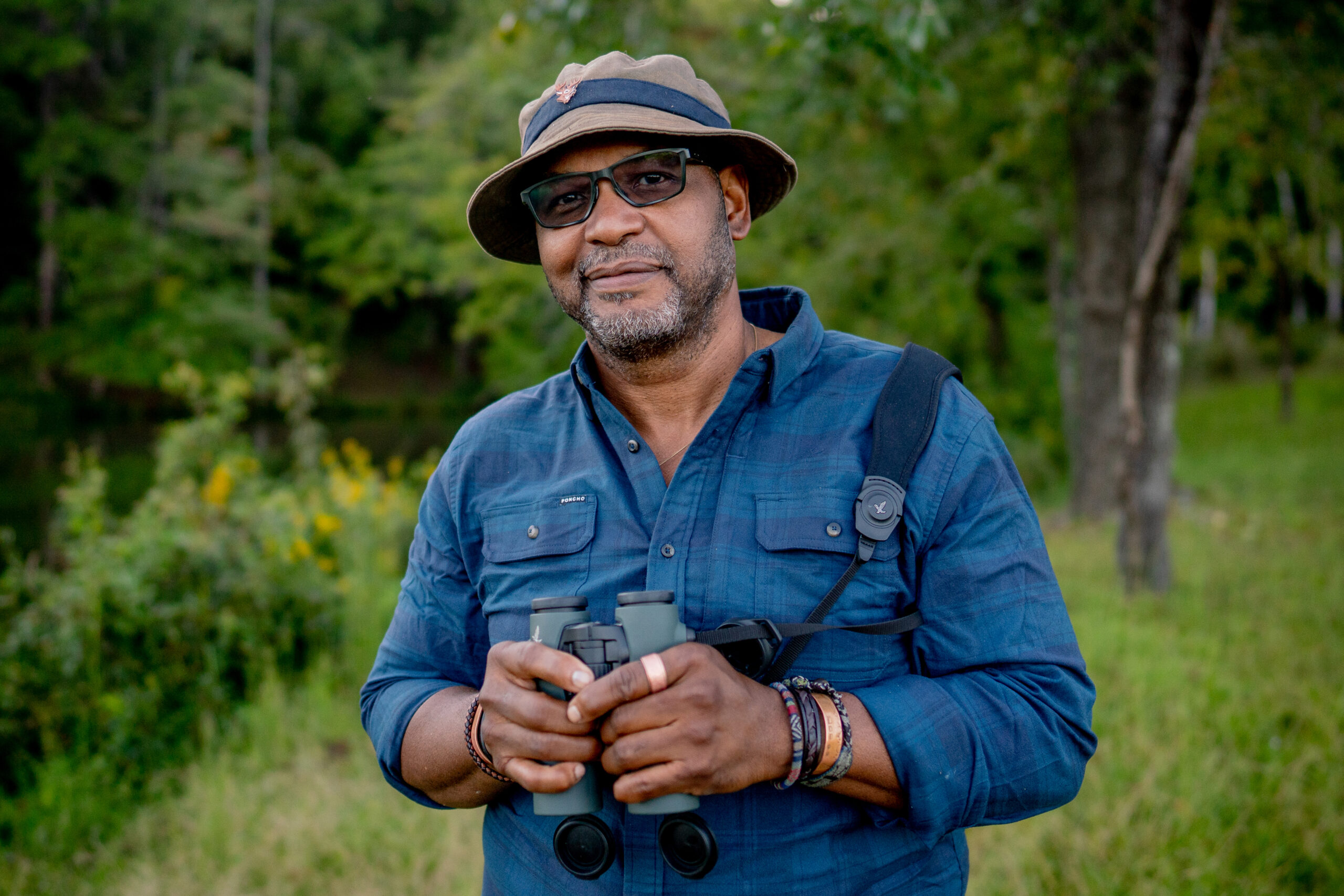
J. Drew Lanham: And for BIPOC [Black, Indigenous, People of Color], impostor syndrome is unfortunately part of the landscape, because society is constantly, again, putting you in an envelope and telling you where you belong, or what you should do. And what you should not do.
Somebody probably says, “Lauren, Black women don’t climb trees, looking for woodpeckers. Why would you do that?”
Lauren D. Pharr: Or people in just disbelief. “Wow. Here’s a Black woman out here, climbing trees and chasing woodpeckers.” That’s the way I like to describe it, whenever I talk about my work. And then people are like, “What? What does that look like?”
J. Drew Lanham: And then you say, “Let me show you.”
Lauren D. Pharr: Yes.
J. Drew Lanham: You know, when you get an award or not — even when someone says, “Good work,” and they recognize what you’re doing is valuable — that’s a tailwind. And that tailwind, that thermal lifts you into this position of going forward or maybe soaring and not having to flap as hard. You know, that’s a critical thing. So that’s what the MacArthur has done to this point.
But still, there are moments of disbelief. And I’m sort of like, “so what are the strings here?”
Lauren D. Pharr: Yeah, yeah. Yeah.
J. Drew Lanham: So, it’s sort of like a personal Emancipation Proclamation. And, you know, when people say, “Well, you’re doing what?” And I haven’t said this, but I almost feel like saying, “Well, I’m being a MacArthur Fellow is what I’m doing.” And, honestly, that sounds really pretty arrogant. But for a few people, it’s almost like you need to say that.
And so when that time comes, and as you become Dr. Pharr, there’ll be a time where you’re like, “you know what, I don’t need that ’doctor.’ To be called that.”
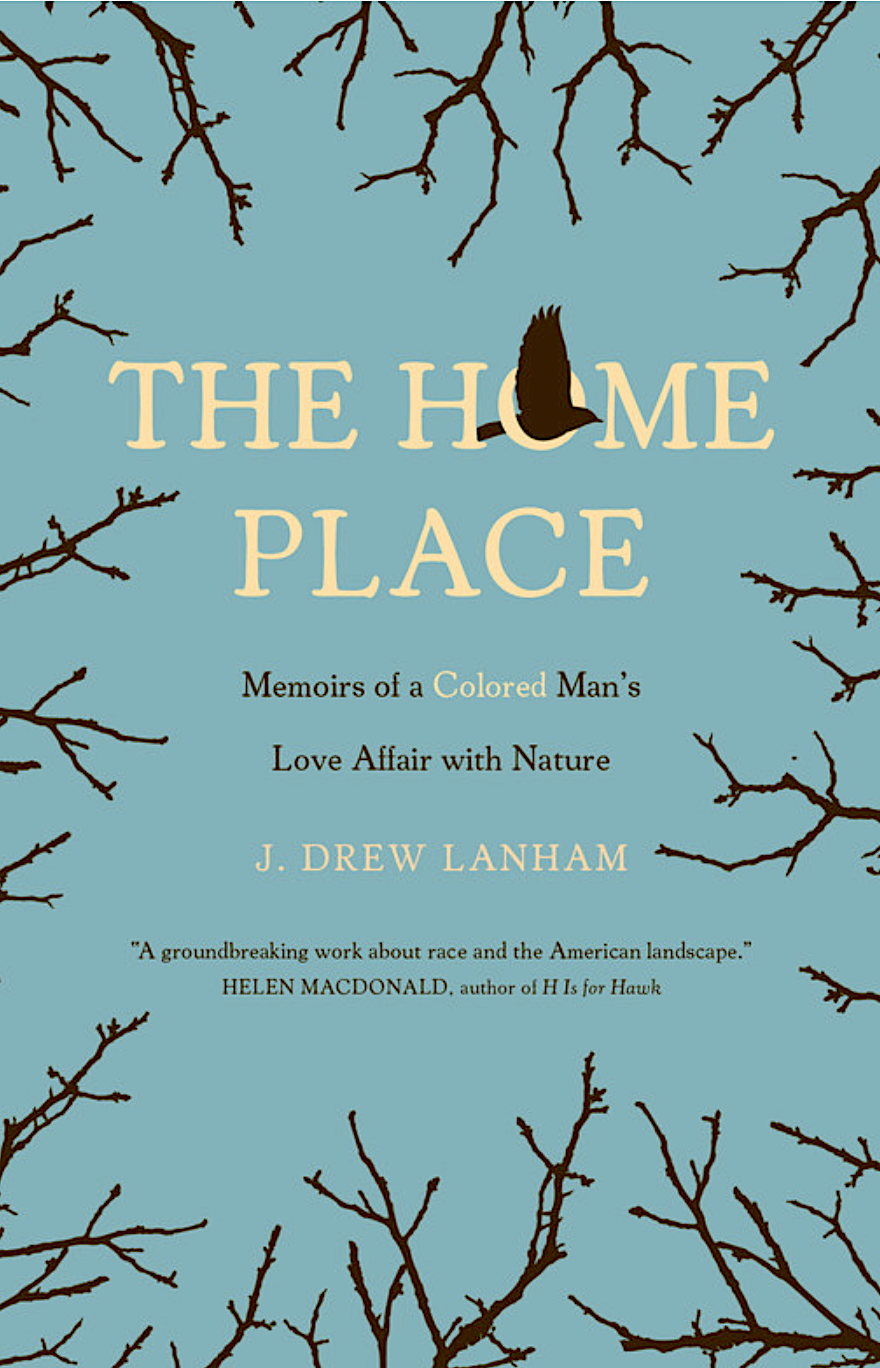
But you know what? Hang on to it. You’ve earned it. And it’s validation of your work and what you have done, because there will be people who try to take that away from you. Make sure that you hold on to what you have worked for. And don’t let anybody take it from you.
And that MacArthur — one of the things they tell you beautifully, because all of us are sitting there in disbelief on the call. We’re like, “I didn’t believe it, I still don’t believe it.” And they say, “Well, when the check comes, you’ll believe it.”
They said, “We don’t make mistakes,” and they said, “The expectation is that you just continue to do you.”
You know how powerful it is for somebody to say, “Do you.” Do you. So that’s the long form of my reaction. But it’s still disbelief. It’s gratitude. And it’s, it’s an opportunity to literally, once in a lifetime, to leverage good into good, hopefully.
Lauren D. Pharr: For me, I remember the exact day, the exact moment when I decided that I wanted to be a wildlife biologist. And as I was looking into grad schools, I stumbled across your profile on Clemson University’s faculty page. How does it feel to be a mentor, to be an advisor? To know that when you win, we in the BIPOC community win? How does that feel? What made you, being a mentor to students and eventually earning you the title of Alumni Distinguished Professor of Wildlife Ecology?
J. Drew Lanham: Wow. You know, it’s been humbling in ways, Lauren, because impact is something, sometimes, that’s not felt, except on sort of the outer edge of the ripple. In the classroom on any given day, you may not realize it, or with students, you may not realize it.
My first Black student, and a wonderful professional now, Dr. Kenan Adams, taught me a lot. He came to me for his master’s degree. And then he stayed on for his PhD.
And his masters was sort of, you know, sort of easy, sort of standard, but we began to develop a relationship. And then his
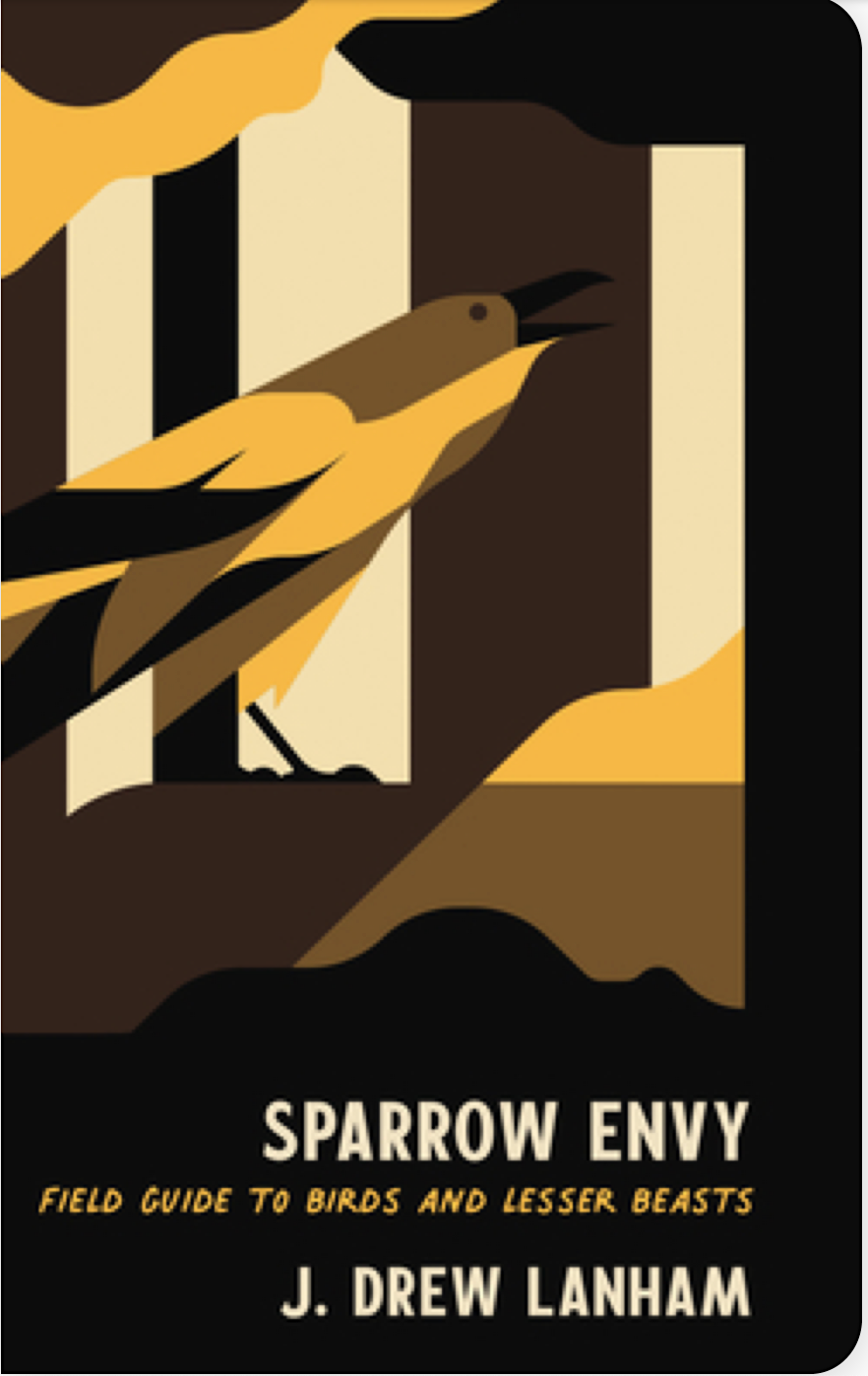
PhD was a little more difficult, and, you know, we were both maturing and evolving as people. But one of the things that, that I think helps me as
a mentor is to be open to learning from students or anybody else, so, to understand that other people’s life experiences and their expectations aren’t necessarily my life experiences and my expectations.
I always want to keep that in mind with everyone. But when it comes to BIPOC, to us and how we relate in this profession, there are still so few of us that I think there has to be a certain intensive attention paid to that.
You’re very kind saying, when I win, we all win. But, I feel like my career has been in so many ways buoyed and supported and made by those people who you may co-author a paper with, but they were out there in the field. You know, Kenan was down there in Bainbridge, Georgia. Marla Hamilton, my first black female student — Marla was out at McIntyre Air Station doing those bird surveys. What they brought to the table was giving me the opportunity to somehow be a part of their lives.
And then seeing them now as professionals, doing wonderful work and impacting others in their own way, then you begin to feel the effects of those outer ripples. That, to me, has been some of the great joy, seeing them do what they do, seeing you doing what you’re doing.
I mean, to have a voice now means that it’s important that you communicate with people where they are, and I know that you’re doing that. To be able to take an Instagram post or a Facebook post or a tweet, and to take a tweet, and use it to translate the tweets that you’re hearing in the field — that’s critical.
So, I’m learning from you. And so that again is sort of what happens to those ripples; they eventually go out, and they dampen against something. But what I think the science will tell you is that there’s a reverb. And so if you listen closely and pay attention, you can feel that reverb. Even sitting here today, it’s a reverb feeling. And I’m grateful for that.
Lauren D. Pharr: I’d like to end today with a quote from you: “I want my work to inspire. I want it to inspire head. I want it to inspire heart. And I want it to inspire some action for a better future.” There is no doubt that your work has inspired and continues to inspire so many people. I’m curious, what is next for you? Any new or upcoming projects or adventures? Is there anything that you wish to do that you haven’t done yet that you hope to do in the future?
J. Drew Lanham: So much, but then just to have time to sit and watch. Right? This place is sort of special to me, and being able to share that with you is important. But, you know, to continue to write with the same depth and urgency and to have somebody notice.
So, thank you for noticing.
Lauren D. Pharr: Thank you for sharing.
more
- J. Drew Lanham
- J. Drew Lanham at the MacArthur Foundation
- “Nine Rules for the Black Birdwatcher”
- The Home Place and Sparrow Envy
- Lauren D. Pharr’s “Wings of Change”
LAUREN D. PHARR is an award-winning science communicator with North Carolina Sea Grant, contributing editor for Coastwatch, Ph.D. student at NC State University, and 2021-2022 Global Change Fellow with the Southeast Climate Adaptation Science Center. She also recently co-founded Field Inclusive, a nonprofit designed to amplify and support marginalized and historically excluded biologists and researchers: fieldinclusive.org.
- Categories:
